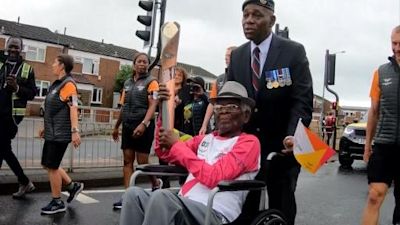Commonwealth batonbearer, 98, who served in Second World War dies after short illness

ITV News Central Reporter Pablo Taylor spoke to Albert and Donald as they carried the Queen's baton last week
A 98-year-old war veteran, who carried the Queen's baton through Fordbridge for the Commonwealth Games, has died on August 2, following a short illness.
Albert Jarrett lived in Birmingham, but was born in Jamaica in 1924. He joined the RAF aged just 17, serving throughout the second world war.
Mr Jarrett's friend and fellow RAF veteran, Donald Campbell, helped nominate him as a baton bearer. Albert was the second oldest batonbearer, out of 2,000 people.
Today, Mr Campbell paid tribute to the 98-year-old war veteran, saying: "Born in Jamaica, left at age 17, Mr Jarrett served successfully in the RAF during WW2.
"Having also served 36 years in the RAF, I have always wanted to meet a WW2 veteran as one of my predecessors.
"I met Jarrett 5 years ago at a VOWS Windrush event, and our journey has been fantastic right up until last Tuesday as a batonbearer and the Commonwealth Games performance at the Alexander Stadium."
Mr Campbell added: "Mr Jarrett was always a gentlemen to whoever he met and was able to effectively communicate his story.
"He felt his life was extended over the past five years by the people he met and the places he went.
"He called me his 'son' and I truly felt like his adopted son as we exchanged laughter on numerous journeys.
"He will truly be missed but long remembered in all our hearts. Lest We Forget."
Mr Jarrett was one of thousands of men and women from all over the Caribbean to answer the call of duty.
Last week, we spoke to Mr Jarrett about his life: "We never stopped to think how serious it is really.
"We just go out and do what you have to do during the war.
"If there is a plane to be shot down, you have to shoot it down because if you don't shoot it down, he's going to shoot you down."After the war Mr Jarrett settled in Birmingham but says the city was a lot different back then."It was hard to find a place to live. There were lots of signs saying 'no dogs, no blacks, no Irish.'
"But now it's nothing like that. It's so pleasing to be here now."